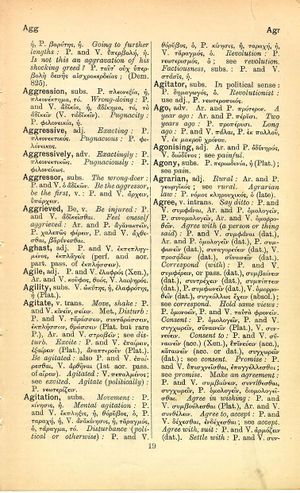agitator: Difference between revisions
αὐτὸν κέκρουκας τὸν βατῆρα τοῦ λόγου → you have struck the very threshold of the argument, you have struck the most important and chiefmost point
(CSV3) |
(6_1) |
||
| Line 5: | Line 5: | ||
<b class="b2">Revolutionist</b>: use adj., P. [[νεωτεροποιός]]. | <b class="b2">Revolutionist</b>: use adj., P. [[νεωτεροποιός]]. | ||
}} | |||
{{Lewis | |||
|lshtext=<b>ăgĭtātor</b>: ōris, m. id., pr.<br /><b>I</b> he [[that]] puts a [[thing]] in [[motion]]; used [[exclusively]] of those [[who]] [[drive]] animals (asses, horses, etc.), a [[driver]] (cf. [[agaso]]): [[agitator]] aselli, [[poet]]. for a [[peasant]], Verg. G. 1, 273: equorum Achillis, i. e. the [[charioteer]], id. A. 2, 476: sustineat currum ut bonu' [[saepe]] [[agitator]] equosque, Lucil. p. 154 Müll.—Hence,<br /><b>II</b> Esp., a [[charioteer]], a [[combatant]] in the games of the [[circus]], Plaut. Men. 1, 2, 50: ego ut [[agitator]] [[callidus]], priusquam ad finem veniam, equos sustinebo, Cic. Ac. 2, 20; Suet. Calig. 55; so Inscr. Orell. 2593 sq.: agitatores consopiti sunt, Vulg. Nah. 2, 3. | |||
}} | }} | ||
Revision as of 08:07, 13 August 2017
English > Greek (Woodhouse)
subs.
In political sense; P. δημαγωγός, ὁ.
Revolutionist: use adj., P. νεωτεροποιός.
Latin > English (Lewis & Short)
ăgĭtātor: ōris, m. id., pr.
I he that puts a thing in motion; used exclusively of those who drive animals (asses, horses, etc.), a driver (cf. agaso): agitator aselli, poet. for a peasant, Verg. G. 1, 273: equorum Achillis, i. e. the charioteer, id. A. 2, 476: sustineat currum ut bonu' saepe agitator equosque, Lucil. p. 154 Müll.—Hence,
II Esp., a charioteer, a combatant in the games of the circus, Plaut. Men. 1, 2, 50: ego ut agitator callidus, priusquam ad finem veniam, equos sustinebo, Cic. Ac. 2, 20; Suet. Calig. 55; so Inscr. Orell. 2593 sq.: agitatores consopiti sunt, Vulg. Nah. 2, 3.

